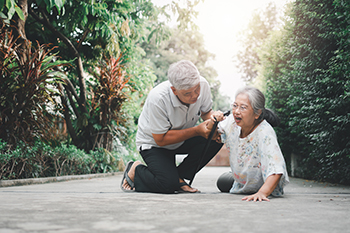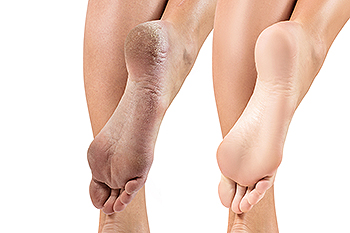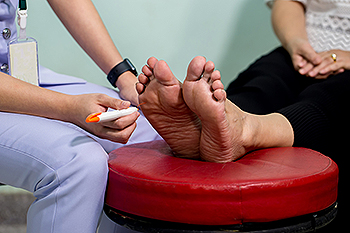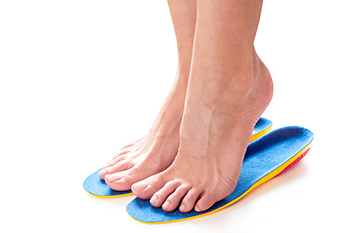Connect With Us
Items filtered by date: April 2022
Exercises Can Help Improve Balance

Many people begin to develop balance problems as they age, putting them at a higher risk of falling. A few simple exercises can be done at home to improve health and mobility. (If you haven’t done any exercise in a while, it is always a good idea to check in with a health professional before embarking on any new program.) Just to be safe during these simple exercises, be sure to stand near a wall or chair, or keep a walking aid nearby before starting. It’s a good idea to start cautiously, building up the number of repetitions gradually to avoid injury. Heel-to-toe walk: Place the heel of your right foot directly in front of your left, looking straight ahead, and step down. Repeat 5 times. You may need to lightly touch the wall for stability. One-leg stand: Stand facing the wall, arms straight out in front, and lightly touch the wall in front of you. Lift one foot off the floor and hold for 5 -10 seconds. Repeat with the other foot. Do this 3 times. Sideways walking: Stand up straight with both feet together. Step out to the side with one foot, transfer your weight, and bring the other foot next to it. Repeat 10 steps. Then reverse direction. If you continue to experience balance problems, it may be a good idea to check in with a podiatrist for a complete biomechanical evaluation.
Preventing falls among the elderly is very important. If you are older and have fallen or fear that you are prone to falling, consult with one of our podiatrists from The Podiatry Center, PC. Our doctors will assess your condition and provide you with quality advice and care.
Every 11 seconds, an elderly American is being treated in an emergency room for a fall related injury. Falls are the leading cause of head and hip injuries for those 65 and older. Due to decreases in strength, balance, senses, and lack of awareness, elderly persons are very susceptible to falling. Thankfully, there are a number of things older persons can do to prevent falls.
How to Prevent Falls
Some effective methods that older persons can do to prevent falls include:
- Enrolling in strength and balance exercise program to increase balance and strength
- Periodically having your sight and hearing checked
- Discuss any medications you have with a doctor to see if it increases the risk of falling
- Clearing the house of falling hazards and installing devices like grab bars and railings
- Utilizing a walker or cane
- Wearing shoes that provide good support and cushioning
- Talking to family members about falling and increasing awareness
Falling can be a traumatic and embarrassing experience for elderly persons; this can make them less willing to leave the house, and less willing to talk to someone about their fears of falling. Doing such things, however, will increase the likelihood of tripping or losing one’s balance. Knowing the causes of falling and how to prevent them is the best way to mitigate the risk of serious injury.
If you have any questions, please feel free to contact our office located in Millburn, NJ . We offer the newest diagnostic and treatment technologies for all your foot care needs.
Why Live with Pain and Numbness in Your Feet?
Dealing With Cracked Heels
 Cracked heels are dry, thick skin that forms on the heels of the feet. It is an unsightly look and can be uncomfortable. Cracked heels or calluses can develop when the fat pad under the heels of your feet expands while walking. This condition can also result from standing for prolonged periods of time, walking barefoot, taking hot showers, using products that strip the skin of its natural oils, or from severe weather conditions. One can try moisturizing home remedies, such as a honey and water scrub or olive oil or petroleum jelly gently massaged into the feet. If the problem persists or worsens, an appointment with a podiatrist should be made to be evaluated and to receive the appropriate treatment.
Cracked heels are dry, thick skin that forms on the heels of the feet. It is an unsightly look and can be uncomfortable. Cracked heels or calluses can develop when the fat pad under the heels of your feet expands while walking. This condition can also result from standing for prolonged periods of time, walking barefoot, taking hot showers, using products that strip the skin of its natural oils, or from severe weather conditions. One can try moisturizing home remedies, such as a honey and water scrub or olive oil or petroleum jelly gently massaged into the feet. If the problem persists or worsens, an appointment with a podiatrist should be made to be evaluated and to receive the appropriate treatment.
If the skin on your feet starts to crack, you may want to see a podiatrist to find treatment. If you have any concerns, contact one of our podiatrists from The Podiatry Center, PC. Our doctors can provide the care you need to keep you pain-free and on your feet.
Cracked Heels
It is important to moisturize your cracked heels in order to prevent pain, bleeding, and infection. The reason cracked heels form is because the skin on the foot is too dry to support the immense pressure placed on them. When the foot expands, the dry skin on the foot begins to split.
Ways to Help Heal Them
- Invest in a good foot cream
- Try Using Petroleum Jelly
- Ease up on Soaps
- Drink Plenty of Water
Ways to Prevent Cracked Heels
- Moisturize After Showering
- Skip a Shower
- Keep Shower Water Lukewarm
- Don’t Scrub Your Feet
If you are unsure how to proceed in treating cracked heels, seek guidance from a podiatrist. Your doctor will help you with any questions or information you may need.
If you have any questions, please feel free to contact our office located in Millburn, NJ . We offer the newest diagnostic and treatment technologies for all your foot care needs.
When Neuropathy Affects the Feet
Neuropathy can generally be referred to as a disease or dysfunction of the nerves. There are different forms of neuropathy which can occur in various locations of the body. When neuropathy affects the feet, it is a malfunction within the peripheral nervous system—which is a network of nerves outside of the central nervous system (comprising the spinal cord and brain) which controls the feet, hands, legs, and arms. This type of neuropathy is referred to as peripheral neuropathy. Neuropathy can be caused by diabetes, autoimmune diseases, infections, alcoholism, genetic disorders, toxins, medications, tumors, and more. Sometimes there is no known cause for neuropathy. Peripheral neuropathy can cause numbness, tingling, pain, or extreme sensitivity to touch in the feet. It may even cause a loss of feeling in the feet which may lead to an inability to detect rapidly developing sores. If you have any of these symptoms, see a podiatrist as soon as possible to devise an appropriate treatment plan.
Neuropathy
Neuropathy can be a potentially serious condition, especially if it is left undiagnosed. If you have any concerns that you may be experiencing nerve loss in your feet, consult with one of our podiatrists from The Podiatry Center, PC. Our doctors will assess your condition and provide you with quality foot and ankle treatment for neuropathy.
What Is Neuropathy?
Neuropathy is a condition that leads to damage to the nerves in the body. Peripheral neuropathy, or neuropathy that affects your peripheral nervous system, usually occurs in the feet. Neuropathy can be triggered by a number of different causes. Such causes include diabetes, infections, cancers, disorders, and toxic substances.
Symptoms of Neuropathy Include:
- Numbness
- Sensation loss
- Prickling and tingling sensations
- Throbbing, freezing, burning pains
- Muscle weakness
Those with diabetes are at serious risk due to being unable to feel an ulcer on their feet. Diabetics usually also suffer from poor blood circulation. This can lead to the wound not healing, infections occurring, and the limb may have to be amputated.
Treatment
To treat neuropathy in the foot, podiatrists will first diagnose the cause of the neuropathy. Figuring out the underlying cause of the neuropathy will allow the podiatrist to prescribe the best treatment, whether it be caused by diabetes, toxic substance exposure, infection, etc. If the nerve has not died, then it’s possible that sensation may be able to return to the foot.
Pain medication may be issued for pain. Electrical nerve stimulation can be used to stimulate nerves. If the neuropathy is caused from pressure on the nerves, then surgery may be necessary.
If you have any questions, please feel free to contact our office located in Millburn, NJ . We offer the newest diagnostic and treatment technologies for all your foot care needs.
Do Your Child's Feet Hurt?
Flat Feet and Orthotics
Many people are born with flat feet. There may be additional causes for flat feet to develop that can include pregnancy, arthritis, diabetes, or even an injury. Orthotics are custom made inserts that are designed to fit inside shoes. Research has indicated that wearing orthotics may help patients with flat feet. The benefits of wearing orthotics can include shock absorption, improved balance, and support for the arch and heel. Additionally, orthotics may reduce existing pain that some patients experience because of flat feet. If you have this condition, and are interested in learning more about how orthotics can help you, please consult with a podiatrist.
If you are having discomfort in your feet and would like to try orthotics, contact one of our podiatrists from The Podiatry Center, PC. Our doctors can provide the care you need to keep you pain-free and on your feet.
What Are Orthotics?
Orthotics are inserts you can place into your shoes to help with a variety of foot problems such as flat feet or foot pain. Orthotics provide relief and comfort for minor foot and heel pain but can’t correct serious biomechanical problems in your feet.
Over-the-Counter Inserts
Orthotics come in a wide variety of over-the-counter inserts that are used to treat foot pain, heel pain, and minor problems. For example, arch supports can be inserted into your shoes to help correct overarched or flat feet, while gel insoles are often used because they provide comfort and relief from foot and heel pain by alleviating pressure.
Prescription Orthotics
If over-the-counter inserts don’t work for you or if you have a more severe foot concern, it is possible to have your podiatrist prescribe custom orthotics. These high-quality inserts are designed to treat problems such as abnormal motion, plantar fasciitis, and severe forms of heel pain. They can even be used to help patients suffering from diabetes by treating foot ulcers and painful calluses and are usually molded to your feet individually, which allows them to provide full support and comfort.
If you are experiencing minor to severe foot or heel pain, it’s recommended to speak with your podiatrist about the possibilities of using orthotics. A podiatrist can determine which type of orthotic is right for you and allow you to take the first steps towards being pain-free.
If you have any questions please contact our office located in Millburn, NJ . We offer the newest diagnostic and treatment technologies for all your foot and ankle needs.
Blog Archives
- April 2025
- March 2025
- February 2025
- January 2025
- December 2024
- November 2024
- October 2024
- September 2024
- August 2024
- July 2024
- June 2024
- May 2024
- April 2024
- March 2024
- February 2024
- January 2024
- December 2023
- November 2023
- October 2023
- September 2023
- August 2023
- July 2023
- June 2023
- May 2023
- April 2023
- March 2023
- February 2023
- January 2023
- December 2022
- November 2022
- October 2022
- September 2022
- August 2022
- July 2022
- June 2022
- May 2022
- April 2022
- March 2022
- February 2022
- January 2022
- December 2021
- November 2021
- October 2021
- September 2021
- August 2021
- July 2021
- June 2021
- May 2021
- April 2021
- March 2021
- February 2021
- January 2021
- December 2020
- November 2020
- October 2020
- September 2020
- August 2020
- July 2020
- June 2020
- May 2020
- April 2020
- March 2020
- February 2020
- January 2020
- December 2019
- November 2019
- October 2019
- September 2019
- August 2019
- July 2019
- June 2019
- May 2019
- April 2019
- March 2019
- February 2019
- January 2019
- December 2018
- November 2018
- October 2018
- September 2018
- August 2018
- July 2018
- June 2018
- May 2018
- April 2018
- March 2018
- February 2018
- January 2018
- December 2017
- November 2017
- October 2017
- September 2017
- August 2017
- July 2017
- June 2017
- May 2017
- April 2017
- March 2017
- February 2017
- January 2017
- December 2016
- November 2016
- October 2016
- September 2016
- August 2016
- July 2016
- June 2016
- May 2016
- April 2016
- March 2016
- February 2016
- January 2016
- December 2015
- November 2015
- October 2015
- September 2015
- August 2015
- July 2015
- June 2015
- May 2015
- January 2014
- December 2013
- November 2013
- October 2013
- September 2013
- August 2013
- July 2013
- June 2013
- May 2013
- April 2013
- March 2013
- February 2013
- January 2013
- December 2012
- November 2012
- October 2012
- September 2012
- August 2012
- July 2012
- June 2012




